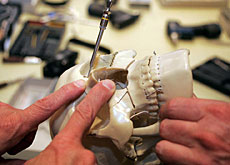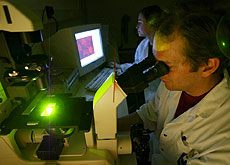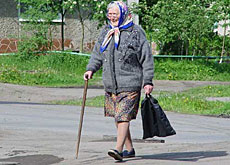Synthes comes of age after severing patent ties

Medical devices firm Synthes is well positioned to pursue its strategy of global expansion after buying its patents from an independent research foundation.
The Solothurn-based firm recently paid SFr1 billion ($770 million) for the intellectual property rights to its orthopaedic products from Swiss non-profit organisation AO Foundation.
Synthes has grown out of all recognition from the original enterprise set up 36 years ago by the AO Foundation, a network of surgeons and experts promoting orthopaedic advances, and the Straumann Institute which produced innovative metal instruments.
Synthes and AO will continue to collaborate, but experts believe the time is ripe for a commercial split so Synthes can expand further.
“Synthes has a wish to be a global company which is why it has recently bought into new markets. Buying the patent rights is the natural way to build itself into an independent global market leader,” Zurich Cantonal Bank analyst Yasemin Ersan told swissinfo.
“It did not make commercial sense for Synthes to pay AO Foundation every time it wanted to sell a product under the Synthes trademark.”
Synthes generates revenues of more than $2 billion a year from its instruments and implants for orthopaedic surgery such as drills, saws, metal plates and pins.
Patent rights
The commercial arm of the Synthes/AO partnership split away in 1990 to create the firms Stratec Holding and Stratec Medical. But AO Holding retained the patent rights for their orthopaedic surgery products.
In 1999, Stratec Holding combined with US company Synthes that specialised in the surgical treatment of spinal disorders. The new company, called Synthes-Stratec, went truly global two years ago when it merged with Swiss firm Mathys Medizinaltechnik to form today’s Synthes.
Since then the company has revealed expansionist tendencies, acquiring synthetic bone maker Norian Corp in 1999 and spine disc replacement specialist Spine Solutions in 2004 and US technology firm Gelifex a year later.
But the complicated patent arrangements with AO Foundation were becoming more fraught with each new acquisition and merger, further fuelling Synthes’s desire to gain more independence.
Unwanted attention
Buying the intellectual property rights should also deflect unwanted attention from the German competition authorities, according to ZKB analyst Ersan.
Having already banned Synthes from merging with Mathys in Germany, that country’s competitions commission then launched an investigation last September into Synthes’s relationship with AO Foundation.
“Synthes hopes that gaining control of its patents will satisfy German regulatory investigators,” Ersan told swissinfo. “Synthes is now more flexible but will continue to work closely with AO Foundation and have access to its network of surgeons.”
Anti-trust
The company recently announced a 34.7 per cent rise in net profit for 2005 and impressive growth in sales. But analysts were disappointed with operating income and gross margins that were dragged down by a burgeoning legal bill in an anti-trust battle in Germany and other costs.
A large slice of the company’s hopes rest on a new spinal disc replacement product called ProDisc. But the success of ProDisc hinges on a US Food and Drugs Administration approval ruling, expected in the first half of this year.
The regulatory body recently rejected a similar product from a Synthes rival.
Share prices have been further weighed by an unexpected fall in medtech prices in Japan, but medium term prospects still look bright for Synthes, according to analyst Christophe Eggmann of Julius Bär bank.
“There has been quite a lot of negative news in a short space of time and it is clear that recent acquisitions need investment,” he told swissinfo.
“I do not expect top line and margins to expand much in the next 12 to 14 months, but the potential for growth remains quite high.”
swissinfo, Matthew Allen
Synthes posted a 34.7% rise in net profit of $436 million in 2005.
Sales rose 16.8% to $2.08 billion, but operating income came in below expectations at $662.2 million.
Share dividend was left unchanged at SFr0.7 per share.
Synthes employs 7,627 people worldwide, and is one of 27 companies listed on the Swiss Market Index (SMI) of blue chip shares.
It has recently expanded globally, particularly in the United States.
Synthes has concentrated on developing core orthopaedic trauma products, divesting its European artificial joint replacement division in 2001 and computer assisted surgery division two years later.
The AO Foundation was set up in 1958 as a non-profit organisation to promote education and advances in the field of orthopaedic surgery. It has developed an extensive network of more than 5,000 surgeons and 3,000 experts in 100 countries.

In compliance with the JTI standards
More: SWI swissinfo.ch certified by the Journalism Trust Initiative




You can find an overview of ongoing debates with our journalists here. Please join us!
If you want to start a conversation about a topic raised in this article or want to report factual errors, email us at english@swissinfo.ch.